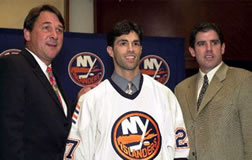
You suck-did-i-ly-uck, Edmonton
If you have been celebrating our short break from Canada's national past-time, you may not have picked up on the latest hockey news making the rounds. For those of you still basking in the break, this story carries is much more than a hockey story -- it is about progress, society and economics (but in essence, it's really about hockey).
As the Carolina Hurricanes were celebrating thier Stanley Cup victoty June 19, they were joined by their wives and children. Despite this symbolic gesture, which demonstrates the important role families play in athletes' lives, the Hurricanes were admonished by many, and most notably in Canada, by Rogers Sportsnet's
Nick Kypreos.In continuing the story line, today's
Toronto Star ran a story "Wives Deciding Athletes' Moves," citing the recent developments with
Chris Pronger and
Mike Peca, who, after carrying the Edmonton Oilers to the Cup final, prompty expressed their respective desires to leave the city of Champions at the bequest of their loved ones (so the reports go).
And rightly so. These families, as pointed out in numerous studies, and most recently opined by
Out of Left Field, endure numerous hardships to support their athletic partners (while certainly not the most infamous case,
Tim Thomas' is an interesting read).
And those in the upper-echelon's of sports management are starting to get it right as well.
From the same Toronto Star story, Maple Leafs GM John Ferguson, on the importance of family in athletes' production:
That kind of support is always a factor in anyone's ability to be at their
best.
And Blue Jay's GM J.P. Riccardi:
It's like any family situation now. There are wives that need to be heard
and the wife has a big say in (her) husband's life.
And while this progressive, feminist-friendly sociologist/sport-enthusiast applauds the acknowledgement athletes' families are finally receiving, my skeptical-self wonders what this will do for sports.
Any sociologist or business analyst will tell you that employers are apt to hire men over women because of the greater potential for a strong return on their investment. For instance, managers and exeutives (of which most are men) see males as dedicated hard-workers, who are not likely to work for three-years, only to take a year off for maternity leave. This perceived "baggage" limits women's potential and opportunity, while also limiting the potential of the company because they automatically disqualify suitable applicants.
However, this begs the question of whether or not teams will be willing to sign or trade for players who come with similar "baggage." For instance, what are the odds that another small-market team is going to offer up valuable assets for someone like Pronger, knowing that his wife was unhappy in Edmonton? Can anyone honesly see him landing in Minnesota or Columbus, cities with similar culture and life-style as other small-market teams?
What about the newly acquired Roberto Luongo and the Vancouver Canucks. Luongo recently married a Floridian and all of his "non-hockey" friends reside in the sunshine state. Is this going to hurt the Canucks chances of signing him long-term? Are they even going to try?
I half-jokingly wonder if professional sports-teams are going to start conducinting socio/cultural- economic studies on potential free-agent signings, draftees or trade-pickups before making a decision? If so, that's great, because it means more guys like me might finally be able to live the dream of playing, er, I mean, working, for a professional sportsr franchise.
More likely, it means more money in the pockets of marketing and advertising firms, as coaches and managers, taking the cue from Raptors GM Glen Grunwald, make promotional videos of a home city in an attempt to woo potential players.
Ultimately, what this leads to seems to be what the NHL lockout was intended to erase, or at the vert least, limit: large-market teams being better equiped to attract big-names. Only this time, the financial playing field may be level, city size, cultural activities and events, services provided and available, will be the selling points. In this case, when a player decides to sign elsewhere for "personal reasons," it can easily be seen as a slight to the vacated city.
And with this in mind, is it really any surprise that the city of Edmonton is taking this snub personally?
I wish to acknowledge the important role my mother and grandmother played in my fledging development as a solid defensive-minded slo-pitch baseball player. I only wish they hadn't provided me with that un-named nickname that I will never live down. Cheers.





 "My face! My face! My beautiful face..."
"My face! My face! My beautiful face..." 

